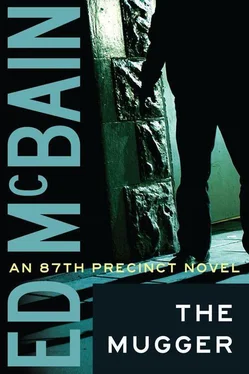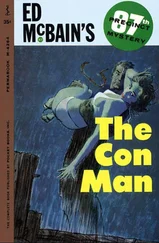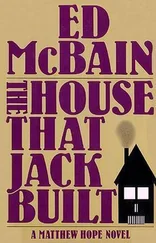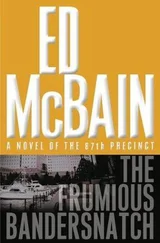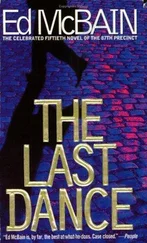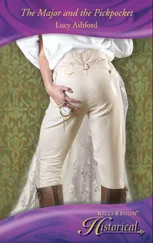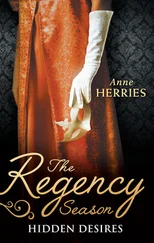This was not a time for Clifford, and this was not a time for murder.
But murder had been done, and the Homicide cops were cold-eyed men who had never been seventeen.
Kling had once been seventeen.
He walked down the steps and directly to the change booth. The man behind the grilled window was reading a “comic” book. Kling recognized it as one of the more hilarious attempts now on the stands, a strip dealing with a widow who had multiple sclerosis. The attendant looted up.
“Good evening,” Kling said.
The attendant eyed him suspiciously. “Evening,” he replied.
“Mind if I ask you a few questions?”
“Depends what the questions are,” the attendant said.
“Well—”
“If you’re planning a holdup, young man, forget it,” the attendant advised. “You won’t get a hell of lot for your trouble, and the cops in this town are pretty damn good on transit stickups.”
“Thanks. I wasn’t planning a holdup.”
“Good thing. My name’s Ruth, Sam Ruth. The fellows call this ‘Ruth’s Booth.’ What can I do for you?”
“Are you usually working nights?”
“Sometimes yes, sometimes no. Why?”
“I’m trying to trace a young girl who generally boarded a train from this platform.”
“Lots of young girls get on trains here.”
“This one usually came up between ten and ten-thirty. Are you on at that time?”
“When I work the afternoon shift, I come on at four, and I go off at midnight.”
“Then you’re on at ten.”
“It would appear that way, yeah.”
“This girl was a blonde,” Kling said. “A very pretty blonde.”
“There’s a blonde widow works in the bakeshop downstairs. She comes up about eight each night.”
“This girl was young. Seventeen.”
“Seventeen, huh?”
“Yes.”
“Don’t recall,” Ruth said.
“Think.”
“What for? I don’t recall her.”
“Very pretty. If you’d seen her, you’d remember her. Well built, big blue eyes, a knockout.”
Ruth squinched up his eyes. “Yeah,” he said.
“Huh?”
“I remember. Nice young kid. Yeah, I remember.”
“What time did she come up?”
“‘Bout ten twenty-five usually. Yeah, I remember her, all right. Always went up the downtown side of the platform. Used to watch her all the way. A damn pretty girl. Only seventeen, you say? Seemed a lot older.”
“Only seventeen. Are you sure we’re talking about the same girl?”
“Listen, how do I know? This blonde came up about ten twenty-five most of the time. Reason I remember her is she once asked me to change a ten-dollar bill. We ain’t allowed to change bigger than two dollars, not that many folks carry two-dollar bills, you know. Consider it hard luck. Superstition’s bad, bad.” Ruth shook his head.
“Did you change it for her?” Kling asked.
“Out of my own pocket. That’s how I remember her. She gave me a big smile. Nice smile, that girl. Nice everything, you ask me. Yeah, she’s the one, all right. Used to go up on the downtown side, caught the ten-thirty train.” Ruth pulled a gold watch from his pocket. He nodded, replaced the watch. “Yeah, caught the ten-thirty.”
“All the time?”
“Whenever I seen her, she caught the same train. After I cashed that bill for her, she always give me a smile. She was worth looking at, all right.”
Kling glanced over his shoulder. The clock on the wall read 10:16.
“If I got on that ten-thirty train,” he asked, “where would I get off a half hour from now?”
“Say, I don’t know,” Ruth said. He thought for a moment. “Can tell you how to find out, though.”
“Yes?”
“Get on it,” Ruth said.
“Thanks.”
“Not at all. Glad to be of help.” He turned back to his comic book, anxious to get back to the funny pages about the sick widow.
The train screeched through the heart of the city, on intimate terms with the windows of the buildings it passed. Kling sat and watched the city pass by in review outside. It was a big city, and a dirty city, but when you were born and raised in it, it became as much a part of you as your liver or your intestinal tract. He watched the city, and he watched the hands of his timepiece.
Jeannie Paige had told Claire there was a half-hour ride ahead of her. She had generally boarded a 10:30 train, and so Kling watched the advancing hands of his watch. The train swooped underground, piercing the bowels of the city. He sat and waited. Passengers came and went. Kling’s eyes did not leave his watch.
At 11:02, the train pulled into a station platform underground. The last stop had been at 10:58. It was a tossup, either way. He left the train and went up to the street.
He was in the heart of Isola.
The buildings reached up to touch the sky, tinting the night with gaudy smears of red and orange and green and yellow light. There was a men’s clothing store on the corner, and a bakery shop, and a hack stand, and a dress shop, and a bus stop up the street, and a movie marquee, and a candy store, and a Chinese restaurant, and a bar, and all the stores and signs that clustered together like close relatives of the same family all over the city.
He sighed heavily.
If Jeannie had met her boyfriend here, and if her boyfriend’s name was Clifford, combing the area would be like searching for a blade of hay in a mountain of needles.
He went to the subway kiosk again, boarding an uptown train this time. He traveled for one stop, figuring the half hour Jeannie had estimated could just as easily have brought her to this station.
The stores and signs he encountered on the street were much the same as those he had just seen. The trappings of a busy intersection. Hell, this stop was almost a dead ringer for the one he’d just visited.
Almost — but not quite.
Kling boarded the train again and headed for his furnished room.
There had been one landmark at the first stop that had been missing at the second stop. Kling’s eyes had recorded the item on his brain and buried it in his unconscious.
Unfortunately, however, it was useless there at the moment.
Science, as any fool knows, is the master sleuth.
Give the police lab a sliver of glass and they can tell you what make car the suspect was driving, when he last had it washed, what states he’d visited, and whether or not he’d ever necked in the backseat.
Provided the breaks are with them.
When the breaks are going the wrong way, science is about as master a sleuth as the corner iceman.
The breaks in the Jeannie Paige case managed to show a total disregard for the wishes and earnest endeavors of the boys in the police laboratory. There had, in all truth, been a good thumbprint on one lens of the sunglasses found near the girl’s body. Unfortunately, it is about as difficult to trace a single print as it is to unmask a Moslem woman. This did not faze the boys in the lab.
Sam Grossman was a lab technician and a police lieutenant.
He was tall and thin, a gentle man with gentle eyes and a quiet manner. He wore glasses, the only sign of science on a rock-hewn face that seemed to have been dispossessed from a New England farm. He worked at Headquarters in the clean, white lab that stretched across half the first-floor length of the building. He liked police work. He owned an orderly, precise mind, and there was something neat and truthful about the coupling of indisputable scientific fact to police theory.
He was an emotional man, but he had long ago ceased identifying the facts of sudden death with the people it summarily visited. He had seen too many bundles of bloody clothing, had studied the edges of too many powder burns, had analyzed the liquid contents of too many poisoned stomachs. Death, to Sam Grossman, was the great equalizer. It reduced human beings to arithmetical problems. If the breaks went with the lab, two and two added up to four.
Читать дальше
